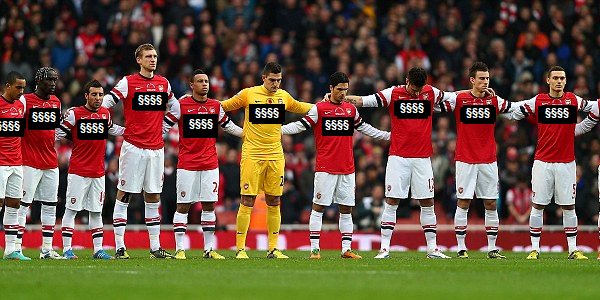UK Gambling Authority Warns Football Association against Unlicensed Operators
Posted: November 21, 2014
Updated: June 4, 2017

The Premier League could lose GBP90 million a year in sponsorship money after it was revealed that its chosen partner doesn’t hold a UK license.
It’s been about three weeks since the newBritish gambling laws have come into force, but it looks like they’re already causing a lot of trouble. The local gambling regulator has sent out a notice to the Football Association (FA), warning it that signing deals with overseas gambling operators that don’t hold a UK license is subject to new regulations.
The move could end up costing the Premier League as much as GBP90 million a year in sponsorship income, as the media has recently revealed that Arsenal has struck a three-year, “multimillion pound” deal with gambling firm Bodog. Now the agreement could be called into question because the Canada-based operator did not apply for a UK license.
The million-pound Bodog deal
Until recently, most online gambling sites in the UK were operated from abroad. As long as they were licensed in any legitimate jurisdiction, they were allowed to reap the benefits of catering to British players without actually paying any taxes in the country.
All this has changed with the new Gambling Act 2014, which came into force at the beginning of the month, after being (unsuccessfully) challenged in court for being “unlawful” and unjustified. And it didn’t just affect online casinos; it is also interfering with football sponsorship agreements.
In August 2013, online operator Bodog and Arsenal signed a deal which was going to help the company profit on the football club’s growing popularity in Asia. While Bodog insists that it does not advertise its
internet casino or online sportsbook in the UK, the deal allows the company to use the club’s image in
marketing campaigns, to generate content with Arsenal players, as well as to access its database of fans.
Under the deal, the Arsenal website has to contain a link to Bodog. Players are also shown wearing
Bodog-emblazoned team shirts and there’s also a promotional video promoting the gambling site,
featuring Theo Walcott.
Clear requirements, vague instructions
Just weeks ago, Nick Tofiluk, head of regulatory operations at the UK Gambling Commission, sent out a
letter warning UK sports clubs and bodies that they have an obligation to make sure that their unlicensed offshore partners block British consumers from their websites. In addition, all advertisements have to clearly state that these services are not available in the UK.
“We are aware that in some cases commercial partnership arrangements (which include sponsorship) are in place between sports clubs or bodies and remote gambling operators who do not hold a Commission
license,” Tofiluk wrote. “Those operators cannot in our view advertise their betting services without both
making it clear in the product as advertised and in reality that betting is not available to those in Britain.”
The message sent out by the commission – that it doesn’t want unlicensed companies to target UK players
– is pretty clear. But unfortunately there are no instructions on how companies should do that. How does one ensure that the message goes through, experts have wondered?
“For example, would players’ shirts, replica shirts and stadium boards which carry a sponsor’s logo each have to include an asterisk to a disclaimer somewhere else on the shirt or board?” gambling law specialist
Susan Biddle asked.
Meanwhile, Adrian Parkinson of the Campaign for Fairer Gambling, is happy to see that the new laws are reducing the UK betting market.
“There isn’t an ideal solution to this, but ultimately we will see the departure of many recognized betting brands from the UK market and a slump in sponsorship revenue for those clubs most in need of it. That may be the price we have to pay in order to have a properly regulated betting market and one that provides adequate protection for gambling consumers,” he said.
Betting adverts, vital for football clubs
Arsenal, Chelsea, Liverpool and Everton have signed some of the most lucrative sponsorship deals with betting operators. These gambling don’t really depend on the few bets taken from British players; instead, they rely on the Premier League’s growing popularity in Asia. Some of them even display their promotional messages in Chinese.
But the gambling commission warned sports clubs that they will be held responsible and even risk prosecution if unlicensed sponsors fail to prevent UK gamblers from accessing their services. Such threats are obviously not very encouraging for the football industry. On the other hand, Bodog already blocks British gamblers.
There is a fair amount of uncertainty around the exact definition of advertising as defined by the Act, so Arsenal said that, in its own interpretation, the deal closed with Bodog does not breach any regulations.
“Bodog do not operate within the UK and the rights Bodog receive from Arsenal are specifically delivered outside Europe and are geo-targeted appropriately. Bodog is not granted any advertising rights by Arsenal that contravene the Act,” an Arsenal spokesperson told reporters.
Let’s hope the football club is right. Otherwise, the industry could be losing a lot of money and find itself in deep financial trouble.
















